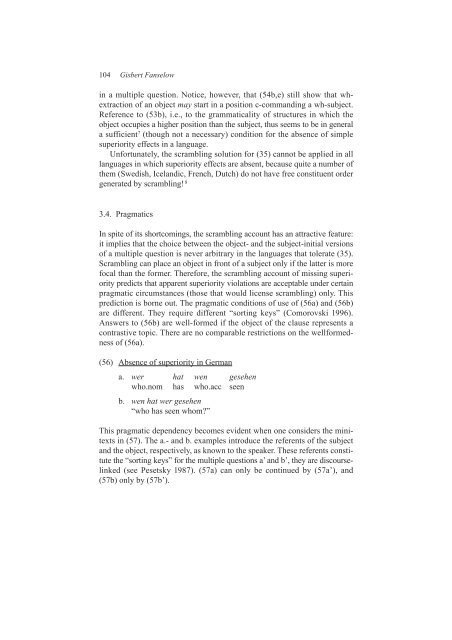Minimality Effects in Syntax · The MLC and Derivational Economy ...
Minimality Effects in Syntax · The MLC and Derivational Economy ...
Minimality Effects in Syntax · The MLC and Derivational Economy ...
You also want an ePaper? Increase the reach of your titles
YUMPU automatically turns print PDFs into web optimized ePapers that Google loves.
104 Gisbert Fanselow<br />
<strong>in</strong> a multiple question. Notice, however, that (54b,e) still show that whextraction<br />
of an object may start <strong>in</strong> a position c-comm<strong>and</strong><strong>in</strong>g a wh-subject.<br />
Reference to (53b), i.e., to the grammaticality of structures <strong>in</strong> which the<br />
object occupies a higher position than the subject, thus seems to be <strong>in</strong> general<br />
a sufficient 7 (though not a necessary) condition for the absence of simple<br />
superiority effects <strong>in</strong> a language.<br />
Unfortunately, the scrambl<strong>in</strong>g solution for (35) cannot be applied <strong>in</strong> all<br />
languages <strong>in</strong> which superiority effects are absent, because quite a number of<br />
them (Swedish, Icel<strong>and</strong>ic, French, Dutch) do not have free constituent order<br />
generated by scrambl<strong>in</strong>g! 8<br />
3.4. Pragmatics<br />
In spite of its shortcom<strong>in</strong>gs, the scrambl<strong>in</strong>g account has an attractive feature:<br />
it implies that the choice between the object- <strong>and</strong> the subject-<strong>in</strong>itial versions<br />
of a multiple question is never arbitrary <strong>in</strong> the languages that tolerate (35).<br />
Scrambl<strong>in</strong>g can place an object <strong>in</strong> front of a subject only if the latter is more<br />
focal than the former. <strong>The</strong>refore, the scrambl<strong>in</strong>g account of miss<strong>in</strong>g superiority<br />
predicts that apparent superiority violations are acceptable under certa<strong>in</strong><br />
pragmatic circumstances (those that would license scrambl<strong>in</strong>g) only. This<br />
prediction is borne out. <strong>The</strong> pragmatic conditions of use of (56a) <strong>and</strong> (56b)<br />
are different. <strong>The</strong>y require different “sort<strong>in</strong>g keys” (Comorovski 1996).<br />
Answers to (56b) are well-formed if the object of the clause represents a<br />
contrastive topic. <strong>The</strong>re are no comparable restrictions on the wellformedness<br />
of (56a).<br />
(56) Absence of superiority <strong>in</strong> German<br />
a. wer hat wen gesehen<br />
who.nom has who.acc seen<br />
b. wen hat wer gesehen<br />
“who has seen whom?”<br />
This pragmatic dependency becomes evident when one considers the m<strong>in</strong>itexts<br />
<strong>in</strong> (57). <strong>The</strong> a.- <strong>and</strong> b. examples <strong>in</strong>troduce the referents of the subject<br />
<strong>and</strong> the object, respectively, as known to the speaker. <strong>The</strong>se referents constitute<br />
the “sort<strong>in</strong>g keys” for the multiple questions a’ <strong>and</strong> b’, they are discoursel<strong>in</strong>ked<br />
(see Pesetsky 1987). (57a) can only be cont<strong>in</strong>ued by (57a’), <strong>and</strong><br />
(57b) only by (57b’).
















